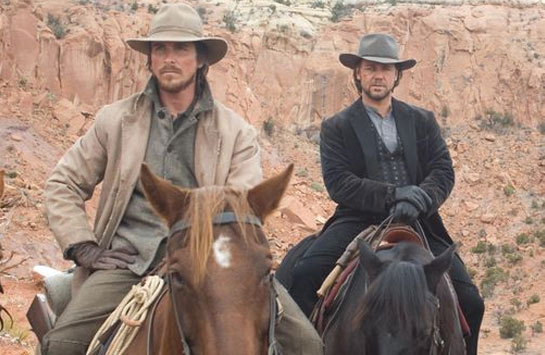3:10 to Yuma has gotten some rave reviews – four stars from Roger Ebert for example – and there is no doubt that it’s a good movie with what may be the best acting Russell Crowe has ever done. But just as that latter detail isn’t necessarily great praise in itself, much of the positive reaction this film has garnered to date (this morning, viewers were ranking it among the 150 best films ever made over at IMDB) has, I fear, been tainted somewhat by its context as the first sorta serious “big” film to arrive in theaters after a particularly barren summer. Once the kiddy action blockbuster flicks that kick off each summer season were out, there was frankly not much to watch. Often the later weeks of the summer are filled with “problematic” movies, jinxed
But
It’s been too many decades since I saw the original version of this film, with Glenn Ford of all people in the Russell Crowe role and Van Heflin as the crippled civil war vet who is desperate enough to agree to take this murderer to the train that is supposed to send him off to his trial & subsequent hanging. The late Halsted Welles, who adapted Elmore Leonard’s short story for the 1957 film, is listed here as a screenwriter as well and surely some of the dialogue that is too corny for words, such as the son’s speech to his dad in the final scene, must have carried over from 1957’s idea of positive family values. These are lines that would have made more sense in The Simpson Movie, where Bart’s contentious relationship with his father would given such silliness an ironic edge. Here it’s like watching a sound crane loom suddenly at the top of the screen – an element of the film-making intruding into the narrative, but without any of the flair of a Brechtian gesture. There is an almost identical moment earlier in the film in which the father addresses Doc after the veterinarian saves them by causing a railroad tunnel to cave in. It makes you wonder just what the hell director James Mangold (Walk the Line; Girl, Interrupted) could have been thinking.
We have a ritual in our family whenever such nonsense appears on screen. When they were younger, my kids would want to know why this Pinkerton, who should have died from blood loss before he ever got to the vet, or from septic shock once he got there, is sassing Ben Wade as they ride through the postcard perfect desert landscape. “How did he live, Pa?” they would ask. “Narrative,” would be my response. “With narrative anything is possible.” For example, a one-legged man might outrun bullets while running, jumping & all but somersaulting over rooftops even as he returns gunfire. You bet.
It’s one thing for such “miracles” to occur in a film involving wizardry & muggles, quite another in a historical drama. When I was a lad of about ten, my favorite TV show was Rin Tin Tin, about a German shepherd in the old west, an odd enough choice for a boy terrified of dogs. Set in a fort somewhere in the last half of the 19th century, each show involved some problem with Indians or rustlers that the dog invariably solved. Rinty, as everyone called him, was more than just the “run and get help” type pup that made Lassie seem ever so wimpy – he could go into K-9 force mode and knock baddies off their horses. But it was disconcerting to watch the action while, in the background, a jetliner clearly traversed the 19th century sky, which happened more than once.
Almost Brechtian in its own challenge to the viewer, Roy Rogers, another one of my childhood TV favorites, set half of its episodes in the 19th century, and half in the present. Sometimes the only way you could tell was that
Wade’s character is crucial to the story, which calls on him to make some surprising choices, more in line with Inspector Renault at the airport in






